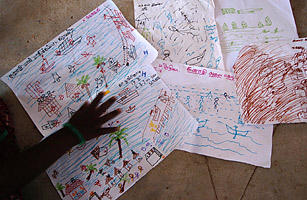
Following the 2004 Asian tsunami, which killed 200,000, an estimated 35,000 children were left without one or both parents. Other families had simply been separated in the mayhem, and the media were quick to point out that it was, sadly, a child trafficker's paradise. Strict adoption laws in countries such as Thailand and Sri Lanka helped to staunch the threat, but reports of children being sold to foreign parents or into slavery were soon issued by the Indonesian government. One official from UNICEF received a copy of an offer for 300 orphans from the Band Aceh area — interested buyers were told all paperwork would be taken care of and asked to state the desired age and sex of the child.
The Indonesian president soon issued blanket bans on any adoption and even inter-provincial travel of children. But child-protection workers continued to worry about what UNICEF simply called "a reality" of the tsunami aftermath, especially in Indonesia where roughly 40 percent of the population is under the age of 18.